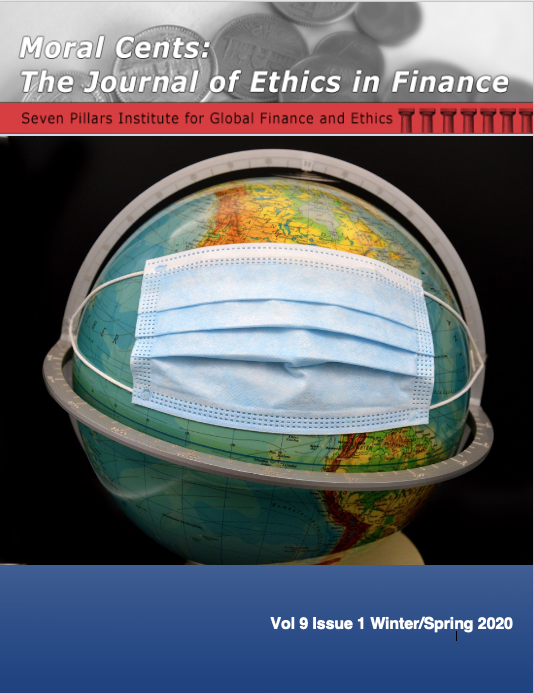Moral Cents: The Journal of Ethics in Finance (Winter/Spring 2020)

We are in the midst of a global pandemic. Consequently, most matters that used to seem important, dwarf in significance in comparison with this new virus currently infecting the world. Yet, we need to soldier on, as we “WFH” and socially distance. Streets fill with more cars and shops welcome a scattering of people venturing out, as governments gradually lift lockdowns across the world.
I have been listening to a variety of experts on webinars and zoom conferences about how capitalism will change after the pandemic. More than a few think economies will not be going back to business as usual because stakeholder capitalism will edge out shareholder capitalism. The Institute has argued since its inception, that self-interest and profit maximization ultimately lead to unethical outcomes in finance. As I wrote in the foreword to a book recently produced by the Transparency Task Force, Why We Must Rebuild Trustworthiness and Confidence in Financial Services; and How We Can Do It:
There is no over dramatization to propose that in order to make finance better, it is necessary to change the very philosophical foundations on which the discipline is based. Since the middle of the twentieth century, there has been a Friedmanite insistence in neo-liberal economics and its stepchild, finance, which, in its quantitative dimension only, is all the rage in business schools, on the primacy of profit maximization. A profit maximizing corporation simply has to operate within the law and not break the rules of the game. In all other instances, the corporation makes no normative judgments. This world view sees finance as independent of any particular ethical position. Instead, the market fully and effectively occupies the space of ethics judgements.
But we have observed time and again the existence of market failures – the Great Financial Crisis is an outstanding example. Ironically, the theory that claims to be ethics free is itself propelled by an ethic: profit maximization. Remarkably, the disciples of the theory are seemingly blind to the reality that at the heart of every financial crisis is an ethical lapse. To put ethics into its rightful place in finance, the first step is the clear and open enunciation of a purpose of finance.
Purpose, or telos according to Aristotle, is the final cause. The reason we do what we do. A noble purpose is more likely to engender good acts, although it does not guarantee every act is good. Aristotle gives a highly relevant example, especially in this Time of Pandemic, by stating the purpose of the medical profession is to help people be healthy. Regrettably, where finance has fallen over the past half century or so is its gradual abandonment of an acknowledged purpose that entails the notion of helping people. Making efficiency the goal of financial activity has led to the collective unconscious equating finance almost exclusively with money, neglecting the connecting link: people.
Since the Great Financial Crisis of 2008, the financial services industry has lost the trust and confidence of a public now weary with regular crises in the world, from stock market crashes to terrorist attacks, and now pandemics. People simply want their financial services to work for them, they want a finance that serves people, rather than exploits people. Let’s face it. In the Time of Pandemic, the healthcare services industry has shown that its practitioners serve people and put human lives first, even sometimes at great risk to themselves. Conversely, in the Time of (and after) the Great Financial Crisis, the financial services industry has shown it serves itself and puts profits first. The contrast cannot be more jarring. READ MORE…
The Institute will continue its work to enhance finance theory so that ethics becomes an integral part of the theory. To that end, the Institute will advocate for finance to have a purpose, one that serves people. This purpose must be commonly accepted and embedded into the collective unconscious, just as many of us have presently internalized the notion of profit maximization as the best goal of private enterprise.
The Institute also will continue to highlight and research on ethical concerns in finance. In this issue of Moral Cents, Georgette Fernandez Laris does a comprehensive and thought-provoking analysis of the Payment Protection Insurance (PPI) scandal in the UK. She examines the reasons for the ethical failure and suggests reforms that diminish the risk of future financial misconduct.
Nancy Cai evaluates the new SEC statement and rules regulating the provision of proxy advice. This arena of corporate governance is important because large asset managers, including mutual funds, such as Blackrock, Vanguard and State Street constitute the single largest shareholder of at least 40% of all US public companies and nearly 90% of the S&P 500. These asset managers have significant clout in influencing corporate elections, but their stewardship is questioned.
Vilasini Pollisetty examines the structure and operation of the Automatic Exchange of Information Agreement (AEOI). While some implementation problems exist, the AEOI is a good way for countries, especially developing ones, to counter tax avoidance, increase tax revenues, and thereby reduce income inequality.
Dr. Kara Tan Bhala
Editor-in-Chief
Moral Cents: The Journal of Ethics in Finance is published by
Seven Pillars Institute for Global Finance and Ethics
ISSN 2326-5663
Editor-in-Chief: Dr. Kara Tan Bhala
Editor: Eric Witmer
